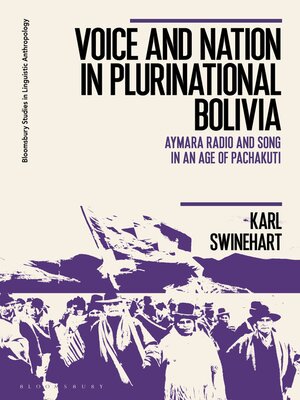Voice and Nation in Plurinational Bolivia
ebook ∣ Aymara Radio and Song in an Age of Pachakuti · Bloomsbury Studies in Linguistic Anthropology
By Karl Swinehart

Sign up to save your library
With an OverDrive account, you can save your favorite libraries for at-a-glance information about availability. Find out more about OverDrive accounts.
Find this title in Libby, the library reading app by OverDrive.



Search for a digital library with this title
Title found at these libraries:
| Loading... |
This book offers ethnographic accounts of Aymara language media activism in Bolivia during the presidency of Evo Morales (2006–2019). It draws on research conducted among Aymara language radio broadcasters, hip hop artists, and community members during a period of radical social change and Indigenous political resurgence (pachakuti) in South America's most Indigenous republic.
The Plurinational Republic of Bolivia counts Aymara among its official languages, but Aymara's social status and transmission to newer generations raise concerns about whether, despite being one of the most widely spoken Indigenous languages of the Americas, the threat of language obsolescence persists. This ethnographic account of Indigenous language activism shows how Aymara media and cultural workers combat this threat by making the language audible in diverse corners of Aymara life and examines the role Indigenous multilingualism plays in Bolivian politics. Through interviews and analysis of Aymara media texts, this study shows how language professionals determine how "the voice of the people" should sound. By introducing neologisms and archaicisms to avoid mixing Aymara with Spanish, Aymara language professionals disseminate a register of dehispanicized Aymara over the airwaves. The study reveals how these language professionals approach cultivating Aymara as more than a question of linguistic competence, but also of political commitment and anti-racist practice.
Organized into two sections, one on radio and one on song, and including clear explanations and illustrations of key concepts in linguistic anthropology, this book listens to Aymara language advocacy from devout Catholics, union militants, and hip hop artists and fans, who hear in their language both the past and the future of Bolivia's Aymaras.
The Plurinational Republic of Bolivia counts Aymara among its official languages, but Aymara's social status and transmission to newer generations raise concerns about whether, despite being one of the most widely spoken Indigenous languages of the Americas, the threat of language obsolescence persists. This ethnographic account of Indigenous language activism shows how Aymara media and cultural workers combat this threat by making the language audible in diverse corners of Aymara life and examines the role Indigenous multilingualism plays in Bolivian politics. Through interviews and analysis of Aymara media texts, this study shows how language professionals determine how "the voice of the people" should sound. By introducing neologisms and archaicisms to avoid mixing Aymara with Spanish, Aymara language professionals disseminate a register of dehispanicized Aymara over the airwaves. The study reveals how these language professionals approach cultivating Aymara as more than a question of linguistic competence, but also of political commitment and anti-racist practice.
Organized into two sections, one on radio and one on song, and including clear explanations and illustrations of key concepts in linguistic anthropology, this book listens to Aymara language advocacy from devout Catholics, union militants, and hip hop artists and fans, who hear in their language both the past and the future of Bolivia's Aymaras.






